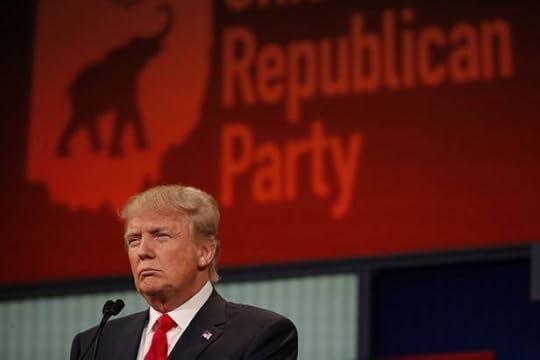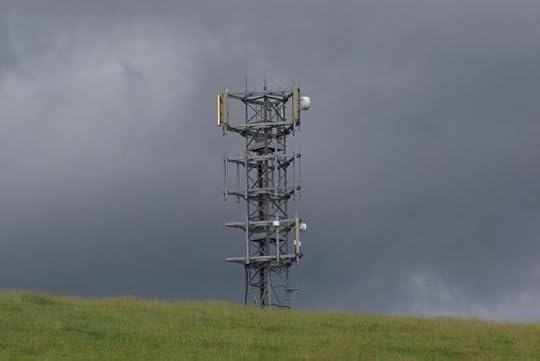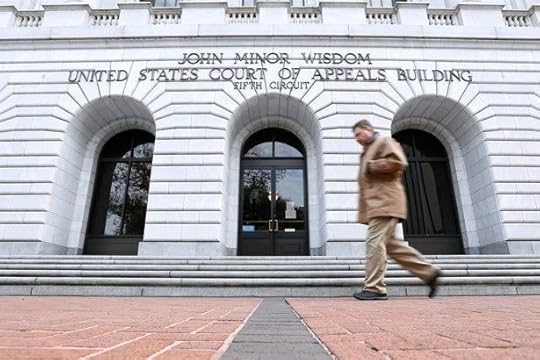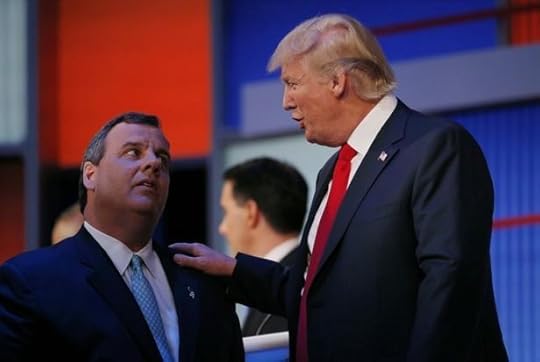Atlantic Monthly Contributors's Blog, page 373
August 8, 2015
‘The Republican Party Created Donald Trump’

ATLANTA—Donald Trump was supposed to be the keynote speaker at the RedState Gathering here, a convocation of the hard-core conservative activists who read the influential blog edited by Erick Erickson. But when Trump said on CNN late Friday that debate moderator and Fox News host Megyn Kelly had “blood coming out of her eyes, blood coming out of her wherever,” Erickson, who is a Fox News contributor, announced he had disinvited Trump from the conference. “There are just real lines of decency a person running for President should not cross,” Erickson wrote.
As the linchpin of a GOP counter-establishment of Tea Party-oriented media and PACs, Erickson may be the most powerful conservative in America. A knowledgeable source confirmed to me last week’s report that he will soon announce his departure from RedState—Erickson’s heart is in his work as a radio host, and he will continue to write commentaries on his personal website. Trump was one of 10 presidential candidates who had accepted the invitation to speak at this year’s RedState Gathering, including Jeb Bush, Scott Walker, Marco Rubio, Ted Cruz, Mike Huckabee, Chris Christie, Bobby Jindal, Rick Perry, and Carly Fiorina.
When Erickson announced Trump's disinvitation to the packed ballroom Saturday morning—playing the offending video for the crowd—there were scattered boos but mostly cheers. Trump responded with a statement claiming he’d said “her eyes and whatever,” and meant her nose; he called Erickson a “total loser” and noted Erickson’s own history of sexist and offensive comments. I interviewed Erickson about the controversy, the effect Trump is having on the GOP, and Erickson’s own standing to criticize anyone for outrageousness. This is a lightly edited transcript of our conversation.
Molly Ball: Why did you disinvite Trump?
Erick Erickson: I would have liked to have had Trump here. I mean, I don’t agree with some of the really bombastic things he’s said, but I know he resonates with a segment of the base, a lot of whom are here. But I just don’t want somebody onstage who would make a comment like he made about Megyn Kelly last night and then—the campaign didn’t even want to admit that he had made it.
Ball: You thought the implication, that he was referring to menstruation, was unmistakable?
Erickson: Oh, yeah. I did. And I don’t know anybody who didn’t think that, other than the Trump people. Now they’re saying he meant “bleeding out of her nose.” Okay, but it took you 12 hours to come up with that. I don’t want somebody onstage who would stay something like that, that doesn’t have the little voice in their head saying, “Maybe that’s not such a good idea.”
Ball: Trump previously insulted veterans and disparaged Christianity. Wasn’t that offensive? Why was this the thing that pushed you over the line?
Erickson: Because when you take tough questions from a journalist and your very first reaction is, “She must be hormonal”—he’s said a lot of things that I don’t necessarily agree with, but when that’s your immediate first reaction about another human being—I said last night on Twitter it was a bridge too far, but it was really more like the straw that broke the camel’s back.
There’s been the accumulated weight of things. When you get to this point, it becomes more of a distraction. I’ve got nine other presidential candidates here, and now they all are going to get asked by people in the media what they think of Donald Trump. I’d rather not bring the distraction onstage.
Ball: Critics note that you also have a history of nasty and misogynistic comments. Do you really have any standing to judge Trump?
Erickson: You know, I’ve said some pretty stupid shit in the past, and I’ve apologized for it. I didn’t deny that I ever said it, I didn’t claim that my Twitter account was hacked. I apologized, said I was wrong, and had to deal with it. Trump’s reaction is, “I said whatever, not wherever.” No, he didn’t. I listened to the tape twice. I played it for the audience; they got the full context of it.
“If being a member of the establishment is recognizing that there are bounds you shouldn’t cross, and if you do you should apologize, then I guess I am.”I think had he come out and apologized for it, which I asked the campaign to do—they were very adamant they weren’t going to—I probably would have let him come and we could’ve dealt with it in the Q and A [session].
But he didn’t want to apologize for it, and he didn’t want to clarify other than “He said whatever, not wherever,” when he didn’t. That wasn’t a clarification. It was a lie.
Ball: You’ve told me before about your fear of becoming an element of the Republican establishment you’ve always opposed. That's what Trump is accusing you of now. Is there truth to the accusation?
Erickson: Oh, a lot of people are telling me today—Donald Trump apparently gave out my email, and I’m being flooded. My favorite was the “cunt whore member of the establishment”—I’d never seen that combination used before.
Ball: But circling the wagons to protect your own, the people you’re friends with—isn’t that what you’re against?
Erickson: Listen, if having common decency to other people makes you part of the establishment, I guess I am. I mean, if you can’t be nice to someone who asks you a tough question, then okay, I guess I am. If being a member of the establishment is recognizing that there are bounds you shouldn’t cross, and if you do you should apologize, then I guess I am.
Ball: Do you think this will be a turning point for Trump?
Erickson: I don’t know that I can even make a prediction about that. I didn’t think he was going to run, and then he did.
I’ve got to believe that your average voter in the Republican Party, who I think are reflected in this room, and who gave me a standing ovation when I played the clip and told them why I was disinviting him, at some point they’re just going to say, “You know, we can find somebody else who gives voice to our anger without saying stuff like that.” Advantage Ted Cruz, I guess.
Ball: You think Cruz benefits if Trump starts to fade?
Erickson: I think maybe so. He’s the other guy out there bashing Washington repeatedly, railing against it. But Ted Cruz would never go on TV or radio and say something like that.
Ball: Who do you like in the presidential field?
Erickson: I’m friends with so many of them. I do like Jeb Bush—I have always liked him and I will not stop liking him.
Ball: Do you take a lot of flak for that?
Erickson: I do. Ted Cruz is a dear friend, Marco Rubio is a friend, Bobby Jindal and Rick Perry are friends, I’ve gotten to know Scott Walker. I text all of them directly. The ones I know the least, probably, are Mike Huckabee and Carly Fiorina, who are here. I’ve got great friends running for president.
Ball: I get the sense you wouldn’t support John Kasich, however.
Erickson: Yes, I’m not a John Kasich fan. I already have a preacher. I don’t need somebody in the White House telling me Jesus told him to expand government.
Ball: Is he the only one who would be unacceptable to you as the nominee?
Erickson: Chris Christie and I disagree on some things, but I think he’s been a good governor, he’s fought the right fights. John Kasich expanding Obamacare in Ohio is something that, if Republicans embrace it, really ends the party in terms of being a meaningful agent of change.
Ball: The rise of Trump has given fodder to people to say, “See, Republicans are a bunch of hateful racists—this is what they want.” What does it say about the Republican Party that he’s doing so well?
Erickson: The Republican Party created Donald Trump, because they made a lot of promises to their base and never kept them.
At this point, most of the people I encounter on radio and on the internet, they’re not really people who at the end of the day want to vote for Donald Trump. But they sure do like that he’s burning down the Republican Party that never listened to them to begin with.









'The Republican Party Created Donald Trump'

ATLANTA—Donald Trump was supposed to be the keynote speaker at the RedState Gathering here, a convocation of the hard-core conservative activists who read the influential blog edited by Erick Erickson. But when Trump said on CNN late Friday that debate moderator and Fox News host Megyn Kelly had “blood coming out of her eyes, blood coming out of her wherever,” Erickson, who is a Fox News contributor, announced he had disinvited Trump from the conference. “There are just real lines of decency a person running for President should not cross,” Erickson wrote.
As the linchpin of a GOP counter-establishment of Tea Party-oriented media and PACs, Erickson may be the most powerful conservative in America. A knowledgeable source confirmed to me last week’s report that he will soon announce his departure from RedState—Erickson’s heart is in his work as a radio host, and he will continue to write commentaries on his personal website. Trump was one of 10 presidential candidates who had accepted the invitation to speak at this year’s RedState Gathering, including Jeb Bush, Scott Walker, Marco Rubio,Ted Cruz, Mike Huckabee, Chris Christie, Bobby Jindal, Rick Perry, and Carly Fiorina.
When Erickson announced Trump's disinvitation to the packed ballroom Saturday morning—playing the offending video for the crowd—there were scattered boos but mostly cheers. Trump responded with a statement claiming he’d said “her eyes and whatever,” and meant her nose; he called Erickson a “total loser” and noted Erickson’s own history of sexist and offensive comments. I interviewed Erickson about the controversy, the effect Trump is having on the GOP, and Erickson’s own standing to criticize anyone for outrageousness. This is a lightly edited transcript of our conversation.
Why did you disinvite Trump?
Erick Erickson: I would have liked to have had Trump here. I mean, I don’t agree with some of the really bombastic things he’s said, but I know he resonates with a segment of the base, a lot of whom are here. But I just don’t want somebody onstage who would make a comment like he made about Megyn Kelly last night and then—the campaign didn’t even want to admit that he had made it.
You thought the implication, that he was referring to menstruation, was unmistakable?
Oh, yeah. I did. And I don’t know anybody who didn’t think that, other than the Trump people. Now they’re saying he meant “bleeding out of her nose.” Okay, but it took you 12 hours to come up with that. I don’t want somebody onstage who would stay something like that, that doesn’t have the little voice in their head saying, “Maybe that’s not such a good idea.”
Trump previously insulted veterans and disparaged Christianity. Wasn’t that offensive? Why was this the thing that pushed you over the line?
Because when you take tough questions from a journalist and your very first reaction is, “She must be hormonal”—he’s said a lot of things that I don’t necessarily agree with, but when that’s your immediate first reaction about another human being—I said last night on Twitter it was a bridge too far, but it was really more like the straw that broke the camel’s back.
There’s been the accumulated weight of things. When you get to this point, it becomes more of a distraction. I’ve got nine other presidential candidates here, and now they all are going to get asked by people in the media what they think of Donald Trump. I’d rather not bring the distraction onstage.
Critics note that you also have a history of nasty and misogynistic comments. Do you really have any standing to judge Trump?
You know, I’ve said some pretty stupid shit in the past, and I’ve apologized for it. I didn’t deny that I ever said it, I didn’t claim that my Twitter account was hacked. I apologized, said I was wrong, and had to deal with it. Trump’s reaction is, “I said whatever, not wherever.” No, he didn’t. I listened to the tape twice. I played it for the audience; they got the full context of it.
If being a member of the establishment is recognizing that there are bounds you shouldn’t cross, and if you do you should apologize, then I guess I am.I think had he come out and apologized for it, which I asked the campaign to do—they were very adamant they weren’t going to—I probably would have let him come and we could’ve dealt with it in the Q and A [session].
But he didn’t want to apologize for it, and he didn’t want to clarify other than “He said whatever, not wherever,” when he didn’t. That wasn’t a clarification. It was a lie.
You’ve told me before about your fear of becoming an element of the Republican establishment you’ve always opposed. That's what Trump is accusing you of now. Is there truth to the accusation?
Oh, a lot of people are telling me today—Donald Trump apparently gave out my email, and I’m being flooded. My favorite was the “cunt whore member of the establishment”—I’d never seen that combination used before.
But circling the wagons to protect your own, the people you’re friends with—isn’t that what you’re against?
Listen, if having common decency to other people makes you part of the establishment, I guess I am. I mean, if you can’t be nice to someone who asks you a tough question, then okay, I guess I am. If being a member of the establishment is recognizing that there are bounds you shouldn’t cross, and if you do you should apologize, then I guess I am.
Do you think this will be a turning point for Trump?
I don’t know that I can even make a prediction about that. I didn’t think he was going to run, and then he did.
I’ve got to believe that your average voter in the Republican Party, who I think are reflected in this room, and who gave me a standing ovation when I played the clip and told them why I was disinviting him, at some point they’re just going to say, “You know, we can find somebody else who gives voice to our anger without saying stuff like that.” Advantage Ted Cruz, I guess.
You think Cruz benefits if Trump starts to fade?
I think maybe so. He’s the other guy out there bashing Washington repeatedly, railing against it. But Ted Cruz would never go on TV or radio and say something like that.
Who do you like in the presidential field?
I’m friends with so many of them. I do like Jeb Bush—I have always liked him and I will not stop liking him.
Do you take a lot of flak for that?
I do. Ted Cruz is a dear friend, Marco Rubio is a friend, Bobby Jindal and Rick Perry are friends, I’ve gotten to know Scott Walker. I text all of them directly. The ones I know the least, probably, are Mike Huckabee and Carly Fiorina, who are here. I’ve got great friends running for president.
I get the sense you wouldn’t support John Kasich, however.
Yes, I’m not a John Kasich fan. I already have a preacher. I don’t need somebody in the White House telling me Jesus told him to expand government.
Is he the only one who would be unacceptable to you as the nominee?
Chris Christie and I disagree on some things, but I think he’s been a good governor, he’s fought the right fights. John Kasich expanding Obamacare in Ohio is something that, if Republicans embrace it, really ends the party in terms of being a meaningful agent of change.
The rise of Trump has given fodder to people to say, “See, Republicans are a bunch of hateful racists—this is what they want.” What does it say about the Republican Party that he’s doing so well?
The Republican Party created Donald Trump, because they made a lot of promises to their base and never kept them.
At this point, most of the people I encounter on radio and on the internet, they’re not really people who at the end of the day want to vote for Donald Trump. But they sure do like that he’s burning down the Republican Party that never listened to them to begin with.









Do Police Need a Warrant to See Where a Phone Is?

Right now, many Americans generate a detailed database of their whereabouts over time—as they move throughout the day from their workplace to their doctor, from their own house to their partner’s—that they do not see or control. It’s called “cell-site location information,” or CSLI, and it can be accessed by local, state, or federal law enforcement without a warrant.
In other words, if the government wants to know your every location for the past year, they never need to prove they have probable cause to suspect you of a crime to a judge.
Does this practice violate the Constitution? Right now, no. But in the past two weeks, its critics have scored some of their first major victories in court.
Gathering this kind of location information, to be clear, is not some uncommon and esoteric procedure: In its most recent annual report, AT&T said it received 64,703 requests for CSLI in 2014. And just in the first six months of this year, Verizon says it received more than 21,000 requests.
That is, in 2015, a single carrier received more than 100 requests daily for the geographic history of an American’s life, as told through their location.
Here’s how this works, technically: At the beginning and end of every call, a cellphone checks in with its mobile carrier. The cell provider notes the phone’s approximate location—the cell tower that it’s closest to, its approximate relationship with the tower—and saves it to its servers.
In the past five years, the extent and specificity of this data has likely increased. Smartphones check in much more often than plainer feature phones, communicating with the carrier—and thus registering location data—whenever they receive a push notification or download something in the background.
Right now, U.S. law enforcement at any level can ask mobile carriers for that database of information for a customer or customers and receive it, virtually as far back in time as they need. If they want a week of data, they can get it; if they want seven months, they can just ask for that, too. Even a county-level detective, wanting to get at that information, never has to prove probable cause to a judge. (Probable cause is the legal standard for granting a warrant in the U.S.: It’s what law enforcement has to prove before they can search someone’s home.)
Instead, law enforcement has to prove to a much lower legal standard, called “reasonable suspicion.” This entails only that “specific and articulable facts” would lead the government to infer suspicion of someone in a crime: It’s the same legal standard cops use to judge whether someone on the street can be frisked for weapons. (They would need to meet probable cause to search that same person for drugs.)
Reasonable suspicion can often be quickly indicated to a judge, who can then issue a court order under the Electronic Communications Privacy Act. In 2012, all major U.S. carriers indicated to ProPublica that they comply with those orders when served.
Over the past few years, two different U.S. appeals courts have ruled on this practice. Both courts, the Fifth and Eleventh Circuits, said that it was perfectly legal: that the process of gathering cell-location data without a warrant didn’t violate the Fourth Amendment’s protection against “unreasonable searches and seizures” of homes, persons, and effects, without a warrant issued under probable cause. That’s because both were working off a piece of 1970s-era precedent called the “third-party doctrine,” which holds that people do not have a reasonable expectation of privacy for information voluntarily given to a third party, like a bank or telephone company.
This week, the Fourth Circuit disagreed. Ruling in Graham v. U.S., it said that gathering such information without a warrant violates the “reasonable expectation of privacy” to which Americans are entitled.
“The Fourth Circuit held, we think correctly, that those old cases from the 1970s were about the voluntary conveyance of really limited, discrete pieces of information to a phone company, or to a bank, or some similar business,” said Nathan Wessler, a staff attorney at the American Civil Liberties Union who filed briefs in the case. “When we’re talking about these cellphone location records, people are not voluntarily conveying that information to their cellphone service providers at all.”
“Unlike the numbers somebody dials into the phone, which have to be routed through the electronic switchboard, people are just making a call, and their location information is being logged and retained in the background without them intending it to be, without them voluntarily letting it be, without them even knowing it will be in most cases,” he told me.
The Fourth Circuit, too, turned to a different piece of precedent to make its argument. It compared the extensive amount of location information revealed by mobile providers to that collected by GPS trackers. Unlike with CSLI, there’s plenty of recent law about that technology: Over the past couple years, the Supreme Court has ruled repeatedly that attaching a GPS tracker to something or someone does constitute search and seizure, and thus requires a warrant.
“Much like long-term GPS monitoring, long-term location information disclosed in cellphone records can reveal both a comprehensive view and specific details of the individual’s daily life,” Judge Andre Davis wrote in the decision. He cited Renée Hutchins, a law professor at the University of Maryland, to make the follow-up point for him: “Citizens of this country largely expect the freedom to move about in relative anonymity without the government keeping an individualized, turn-by-turn itinerary of our comings and going.”
Most importantly, the Fourth Circuit’s decision on Wednesday increases the likelihood that the Supreme Court will take up the issue of warrantless cellphone location tracking. There’s now a circuit split on the issue, meaning two different federal appeals courts have ruled different ways on the same chunk of law. This practically begs the high court to wade into the pool and sort things out.
And it may have reason to. Last week, the American Civil Liberties Union asked the Supreme Court to take up the CSLI question in a different case, U.S. v. Davis. In that case, a U.S. attorney investigating a string of robberies in Miami asked MetroPCS, the cell provider for the suspect, not for cell-site data from the seven days when the crimes occurred, but for 67 days of complete CSLI. The question there—as was the question before the Fourth Circuit in U.S. v. Graham—is whether a warrant is required for long-term CSLI requests. (Though in the more-recent Graham, the government asked for 221 days of records—more than seven months of location history.) Experts aren’t sure if this particular case will be the one destined for the Court, but it seems likely that it will take up the issue soon.
Even before that petition, though, warrantless CSLI collection had was already back in the news, after a district-court judge in northern California, Lucy Koh, said the practice violated the Constitution. Koh’s opinion is less consequential than the various Circuits courts—it only holds in her district—but it took special aim at cell-provider privacy policies, which often allude to the practice in an attempt for legal cover.
Whether or not the Court hears a CSLI case in next year’s term or three terms from now, it’s likely to continue a trend: that the federal judiciary, not Congress, is doing the work of adjusting the Fourth Amendment for the digital age. The Supreme Court has been engaged in that effort for the past two decades: in Kyllo v. U.S., when it ruled that infrared imaging a house constituted a search; in Riley v. California, when it ruled that law enforcement could not search a smartphone without a warrant; and in U.S. v. Jones, when ruled the same about GPS trackers. Congress could take up the mantle—a bipartisan bill about CSLI has lingered in its higher chamber for years—but, in this case, the slow and steady branch is moving faster than the deadlocked one.









Tinder and One Direction: The Week in Pop-Culture Writing

Eat, Pray, Post
Navneet Alang | The New Republic
“When ... global culture flows in mostly one direction—the fact that it is in English and borrows its style from Brooklyn and L.A.-based blogs—we have a larger problem: Virality starts to look like soft cultural imperialism. It’s an assertion of Western values, neatly packaged as 7 GIFs You Won’t Believe.”
Tinder and the Dawn of the Dating Apocalypse
Nancy Jo Salas | Vanity Fair
“As the polar ice caps melt and the earth churns through the Sixth Extinction, another unprecedented phenomenon is taking place, in the realm of sex. Hookup culture, which has been percolating for about a hundred years, has collided with dating apps, which have acted like a wayward meteor on the now dinosaur-like rituals of courtship.”

Miles Teller Is Young, Talented, and Doesn’t Give a Rat’s Ass What You Think
Anna Peele | Esquire
“The waitress delivers the entrées, scallops for him and pork belly for you. The pork looks great and you offer him some. ‘I’ll take a little bit,’ he says, sawing at it. Then: ‘I can’t cut this.’ You have to cut his meat for him, a man who 10 minutes earlier showed you an iPhone photo of his back muscles to prove how strong he is.”
One Direction Are Our Manic Pixie Boy Band
Lindsay Zoladz | Vulture
“They’re a boy band perfectly compatible with the coming era of the strong woman. They worship her even more than she worships them. Four humble, immaculately coiffed servants bowing to millions and millions of queens.”
Death of a Mockingbird
Elaine Showalter | Literary Review
“Scout is no longer a six-year-old tomboy, furious that she cannot do everything Jem does, but an adult very uncomfortable with the imprisoning feminine role.”
Alternatives to Alternatives: the Black Grrrls Riot Ignored
Gabby Bess | Broadly
“The Riot Grrrl box may have been decidedly off-limits in the eyes of Brown and other black women who couldn’t see themselves in the movement, but as Davis points out, these women shirked boxes, created their own wave, and reclaimed rock for black women. After all, rock music is black music.”
Gwen Stefani, Nicki Minaj, Jennifer Garner, and the Dilemma of the Powerful Woman
Molly Lambert | Grantland
“Tabloids help keep women in a permanent state of fear—that women, even powerful women, need to make themselves subservient to their male partners in some way and that even if you do that, it’s no guarantee the male won’t roam and seek out somebody younger and hotter. It’s misogyny, but it’s also misandry—making all men out to be insecure assholes who can’t help but be emasculated by women’s success.”
Op-Ed: I’m Breaking up With Drake
Meaghan Garvey | Pitchfork
“Drake is the chilling logical extreme of the beta male’s triumph over the last decade: the ultimate evolution of the nerd turned jock, forever working every angle of his underdog status that may or may not have ever been merited but certainly isn’t anymore.”









August 7, 2015
A Colorado Jury Spares James Holmes' Life

Three years after James Holmes stormed a theater in Aurora, Colorado, killed 12 people and wounded 70 more, a jury sentenced him to life imprisonment without parole. By sparing Holmes the death penalty, the jury followed a national trend of diminishing the capital punishment's role in American criminal justice.
The jury of three men and nine women deliberated for less than a day before reaching their verdict. Only a unanimous jury can impose a death sentence, meaning only one juror would have been needed to spare Holmes’ life. The jury was not polled after the sentences were announced.
A Denver Post poll found Coloradans supported the death penalty for Holmes by a 2-to-1 margin. Despite public support for capital punishment, Colorado rarely uses the death penalty: Three defendants sit on the state’s death row; the last execution took place in 1997.
Had Holmes been sentenced to death, his case likely would have languished in the appellate system for years or even decades. Central to his defense strategy were well-documented claims of mental illness, though prosecutors disputed the extent of his illness and the role it played on the night he attacked the theater. During closing statements in the penalty phase, Holmes’ defense counsel Tamara Brady cited the convicted shooter’s mental illness and urged jurors to spare his life.
The year 2015 has been mixed for the capital punishment debate. Nebraska legislators overrode Governor Pete Ricketts’s veto to abolish the death penalty in May, though Ricketts is now leading a petition drive to put the issue on the next ballot. Juries in Texas, the nation’s most-prolific modern wielder of capital punishment, have not handed down a single death sentence so far this year. But in Massachusetts, a state that formally abolished the death penalty more than 30 years ago, a Boston jury sentenced marathon bomber Dzhokhar Tsarnaev to death on federal charges in May.
These upheavals in American capital punishment do not signal its imminent abolition, but the trajectory appears clear. The U.S. Supreme Court rejected a major challenge to Oklahoma’s troubled lethal-injection protocol in Glossip v. Gross last month, upholding the use of midazolam, the drug used in the botched execution of Clayton Lockett. But Justices Stephen Breyer and Ruth Bader Ginsburg dissented from the ruling by effectively renouncing the death penalty in all circumstances—a promising sign for the abolition movement. The justices’ move comes amid a nearly two-decade-long trend of fewer death sentences and fewer executions.
This debate raged largely beyond the courtroom in Aurora, where all attention was on Holmes and the suffering he brought to an entire community. He reportedly showed little emotion after the verdict was read; the loved ones of his victims wept in the courtroom. They will have a chance to address the presiding judge before he hands down a formal sentence in the next few weeks.









A Circuit Court Update

The U.S. Supreme Court may be on summer recess, but the lower courts continue to hear cases and issue rulings. Three rulings this week from the Fourth, Fifth, and Seventh Circuits are worth noting.
First, the Fifth Circuit ruled Wednesday that SB 14, Texas’ voter-ID law, violated the federal Voting Rights Act of 1965. My colleague David Graham has a full write-up on the Texas ruling, a similar case in North Carolina, and the Voting Rights Act’s future. Last term, for example, the Supreme Court declined to hear a Seventh Circuit decision upholding Wisconsin’s voter-ID law.
Also on Wednesday, the Fourth Circuit handed a major ruling on warrantless-cell-phone tracking. In United States v. Graham, a three-judge panel ruled 2-1 that the federal government violated the defendant’s Fourth Amendment rights by obtaining his cell-phone location data without a warrant. It’s a major ruling, and my colleague Robinson Meyer will have more details on it soon. Graham adds to an already-tangled thicket of circuit-court opinions on how to apply the Fourth Amendment to cell-phone tracking. The likelihood is high that the Supreme Court will hear a case on the issue in the next few years.
The third case doesn’t invoke a circuit split (yet), but it does contain a major interpretation of a recent Supreme Court case, Johnson v. United States. If you haven’t heard of Johnson, there’s a good reason: The Court published it the same day as Obergefell v. Hodges, the same-sex marriage case. Johnson may not have been the culmination of a 40-year movement for human equality, but its impact is still significant.
In Johnson, an 8-1 majority of the Court struck down the residual clause of the Armed Career Criminal Act as unconstitutionally vague. Congress passed the ACCA in 1984 to impose longer sentences on convicted felons if they had previously been convicted three or more times of certain crimes. The Act spelled out some of the crimes that would count and included a residual clause for other crimes that might apply. Under that clause, if a defendant had multiple previous convictions for crimes that “[involve] conduct that presents a serious potential risk of physical injury to another,” judges could add additional years in prison to the sentence, up to and including life imprisonment.
Which crimes indicate a “serious potential risk” of future violence? Lower courts struggled to find a coherent or empirical method to measure it. “A statistical analysis of the state reporter? A survey? Expert evidence? Google? Gut instinct?” asked Judge Alex Kozinski of the Ninth Circuit in a 2009 case. Some arbitrariness is inevitable in the criminal-justice system, but the whims of a judge’s interpretation here could add decades of imprisonment. A kaleidoscope of interpretations sprung forth throughout the country. The Supreme Court heard four cases on the clause’s meaning within the last decade.
In June, the Court threw in the towel and ruled the residual clause was so vague and arbitrary it violated Johnson’s Fifth Amendment right to due process. The decision benefits Johnson, whose case was remanded to the lower courts for further hearing and possible resentencing. It will also benefit future defendants whose sentences could have otherwise been extended. In one jurisdiction, the decision now benefits current inmates, too. On Tuesday, a Seventh Circuit panel ruled in Price v. United States that a defendant sentenced under the ACCA could now file a petition for resentencing based on Johnson.
It’s important to note that retroactivity is not the norm; new constitutional rules of criminal procedure typically aren’t applied to cases that have already become final. But a Supreme Court ruling can be applied to resolved cases if the Court creates a new substantive rule. In Price, the Seventh Circuit panel concluded that the Supreme Court did exactly that in Johnson.
In deciding that the residual clause is unconstitutionally vague, the Supreme Court prohibited “a certain category of punishment for a class of defendants because of their status.” A defendant who was sentenced under the residual clause necessarily bears a significant risk of facing “a punishment that the law cannot impose upon him.” There is no escaping the logical conclusion that the Court itself has made Johnson categorically retroactive to cases on collateral review. (citations omitted)
The panel’s interpretation only counts as binding legal precedent for federal cases in its jurisdiction, namely Illinois, Indiana, and Wisconsin. But judges in other federal appeals courts could borrow its reasoning for cases throughout the country. If they do, how many prisoners could ultimately be resentenced as a result of Johnson? No definitive numbers exist, but Ohio State University law professor Douglas Berman estimates as many as 7,000 federal prisoners are serving sentences under the ACCA. That could mean hundreds of inmates are eligible for resentencing nationwide, depending on whether or not the residual clause was part of their original sentences.









Photos of the Week: 8/1-8/7
 A Republican presidential debate, flooding in Pakistan, a lost whale in Argentina, an eagle on the Empire State building, the Aquatics World Championships, a Tyrannosaurus Rex, the anniversary of the bombing of Hiroshima, Miss Bumbum Brazil, and much more.
A Republican presidential debate, flooding in Pakistan, a lost whale in Argentina, an eagle on the Empire State building, the Aquatics World Championships, a Tyrannosaurus Rex, the anniversary of the bombing of Hiroshima, Miss Bumbum Brazil, and much more. 








Scott Walker and Jeb Bush Have a Rough Night

Only one debater left Cleveland in a stronger position than when she arrived, and the pronoun gives away her identity: Carly Fiorina. She managed the rare trick of maintaining her dignity while demonstrating her combativeness. Whichever pundit first suggested that there might be advantages to appearing on the less contentious 5 p.m. stage rather than the 9 p.m. all-holds brawl—that pundit had a point.
The majority of the debaters leave Cleveland no worse off than they were before. But the two candidates long thought of as front-runners look seriously worse today than yesterday: Jeb Bush and Scott Walker.
Donald Trump was riding high before the debate and continues to ride high now; Jim Gilmore and George Pataki had nowhere to go but up; for John Kasich, simply making it onto the 9 p.m. stage counted as a victory; and Rand Paul and Chris Christie face campaign problems that are so serious that one bad night at a debate doesn’t make a difference.
A few candidates return home bruised, but for now unbloodied. Even Ben Carson’s most fervent admirers must wonder today whether politics really is the right field for his talents. Marco Rubio—who generally showed to advantage last night—was pushed to take a position on granting exceptions in the cases of rape, incest, and danger to the life of the mother to a hypothetical abortion ban. He seemed to suggest that he was opposed to such exceptions—the right answer for a Republican primary, apparently, but the wrong answer for a general election.
For Walker and Bush, though, the evening was a disappointment. Both men planned their debate on the assumption that it was more important to survive than to win. Jeb Bush, after all, is the heavy favorite among the Republican Party’s big donors, a group that usually gets its way. Scott Walker has positioned himself as the single candidate least unacceptable to all major Republican factions—the kind of candidate who got picked in the era of the smoke-filled room and who still often prevails today (think Bob Dole for the Republicans in 1996, or John Kerry for the Democrats in 2004). Novelty candidates may flare from time to time, as they did in 2012, but Bush and Walker have the financial and political resources for the long march—or so they and their backers can believe.
That belief took a battering last night.
While Rubio had to be pushed toward the Todd Akin position on abortion, Walker willingly identified with it. That’s a dangerous position for the candidate whose selling point is that he’s uniquely acceptable both to ideological activists and to the electability-minded mainstream. The case for Walker is that he’s principled, if uncharismatic. The case against him is that he’s doctrinaire and unpersonable. Megyn Kelly’s question, “Are you too extreme?” gave Walker the opportunity to reveal a more nuanced, thoughtful, compassionate side. Such a self-revelation might have inspired party leaders to think, “Here’s our best back-up plan if Jeb Bush fizzles.” They now have to worry whether Walker might actually be a less-articulate and self-disciplined version of Ted Cruz.
Party leaders now have to worry whether Walker might actually be a less-articulate and self-disciplined version of Ted Cruz.As for Jeb Bush, he had the worst night of all. His job in these debates is to replicate Mitt Romney in 2012: to prove himself the most professional, most knowledgeable, and least-flawed choice in a big field. The activists may not like it, but as one after one of their preferred alternatives falters, they will have to submit to the reality, “Guys, there’s only one potential president on that stage.”
The essential precondition for replicating the Romney strategy is to avoid mistakes. Jeb Bush keeps stumbling into them. In May, Megyn Kelly hit Jeb Bush with the hardest—but also single most-predictable question—he faced as a candidate: Knowing what you know now, would you have supported the Iraq war in 2003? Bush famously floundered for nearly a week before at last pronouncing the answer: No. Last night, Kelly hit with the equally predictable follow-up: If Iraq was a mistake, as you now agree, what do you say to those who lost their lives in your brother’s war? Bush floundered again.
Bush’s troubles must raise two concerns in the minds of his supporters, one mildly disquieting, one extremely so.
Mildly disquieting: If a candidate can’t cope well with the predictable hard questions, how will he cope with the unpredictable hard questions?
Extremely disquieting: Doesn’t a Jeb Bush nomination inevitably reframe the 2016 election as a referendum on George W. Bush’s legacy, Iraq and all? (I should mention: I worked as a speechwriter in the administration of Jeb Bush’s brother; my wife has donated to Walker’s SuperPAC.) Jeb Bush may answer that he is his “own man,” but doesn’t his mere presence guarantee that questions will continually be asked about decisions made a decade ago and more—and doesn’t he have less freedom to find new answers than any one else on either the 9 p.m. or 5 p.m. stage?
Neither Walker nor Bush committed a fatal error last night. But they lent credence to doubts that can only grow. It may be that while their campaigns are designed for the long haul, the inherent difficulties of their candidacies will prove even more enduring.









Why the GOP Just Can't Quit Donald Trump

A candidate appears on the stage of a Republican primary debate and praises single-payer health care in Canada and the United Kingdom. He upbraids the corruption of American campaign finance. He denounces the Iraq war. He scoffs at banks and bankers—and promises to renegotiate the U.S. national debt. He ranks (or anyway, ranked) first in all the polls for the Republican nomination. It sounds more like a scene from an Aaron Sorkin series than real-world politics. Yet it happened last night on Fox News.
More incredible still: The Fox interviewers hammered this candidate unrelentingly hard—and it is the interviewers, rather than the bold-minded candidate, who have been widely hailed as models of independence and integrity. To most actual Aaron Sorkin fans, meanwhile, the stereotype-smashing candidate himself remains something between a joke and a pariah.
Nor are the Sorkin fans wrong, necessarily. The candidate in question is Donald Trump, after all. But it’s worth thinking about why the man who in many ways qualifies as the most liberal Republican in the race should get so very little acclaim from those who have hailed the party’s great moderate hopes from Jon Huntsman to John Kasich.
Rand Paul did more with less. In 2014, he earned a glowing Time magazine cover by questioning police power, drug laws, and American interventions abroad. You can see why those positions would be congenial to Time. But why isn’t Trump at least “interesting”? His policy preferences are much more unpredictable than Paul’s. Paul is constrained by a coherent ideology, by the preferences of his donors and supporters, and by some internal commitment to consistency and sincerity.
Trump is burdened by none of these things. Like an electron in quantum mechanics, he can materialize almost anywhere in the political universe, obeying only some opaque internal decision-making of his own. No, he’s not “sincere.” No, he’s not “thoughtful.” He’s certainly not consistent. But he’s a genuine and even extreme maverick in a media environment that—one might suppose—relishes mavericks above all.
But he hasn’t received the fawning admiration of the political press corps, and the reason why is not mysterious. Modern liberalism admires three kinds of politics: equality politics, peace politics, and diversity politics.
Equality politics is the politics of wealth and income, of social insurance and retirement security. Peace politics is the politics of war, intervention, and surveillance.
Diversity politics is harder to define. It is the messy complex of issues that involves claims against the historic-American ethnic majority and traditional American gender roles. It’s not always clear in advance what these issues will be. One of Rand Paul’s clever strokes, for example, was to recast the traditional libertarian position on drugs (it’s your body, you should be able to put into it whatever you like, whether that’s cocaine or trans fats) in terms of diversity politics (drug prohibition bears too hard on disadvantaged minority groups). The first position is not “interesting” in the Time magazine sense of "interesting.” The second is.
The usual rule is that peace politics trumps equality politics. (That’s why the very fiscally conservative but intervention-skeptical John Huntsman attracted such favorable coverage in 2012. His stance on climate change helped too.)
But diversity politics trumps them all, as Bernie Sanders—a vociferous practitioner of both equality and peace politics—was reminded to his chagrin at this year’s Netroots Nation convention.
Trump was lofted into first place in the Republican polls by his noisy rejection of all the normal rules of diversity politics. He talked about immigration when few other politicians wanted to—and he talked about it in the way almost no other politician does, by insisting that immigration policy should be based upon the interests of the citizens of the United States first and foremost.
He didn’t talk about the subject very wisely, very well, or very effectively. But he broke the taboo, and that is what has brought him his audience. That is why he survived his ghastly remarks about John McCain and why he very likely will survive his poor performance in Ohio last night.
Trump has been derided as the Conservative Id and worse, and maybe all of that is true. It’s also true that diversity politics is a politics in which one side utterly dominates all conventional—even all legitimate—modes and channels of expression. Yet diversity politics remains politics, which means it remains contested.
If the contest is suppressed, it does not vanish. It erupts in ways that are extra-political and anti-political, led by figures who are half-demagogue, half-clown. We’ve seen that happen in Europe. In Italy, for example, the second-largest party in Parliament—the populist protest Five Star Movement—is led literally by a comedian. Trump is bidding for a similar role in the United States.
Such a project probably won’t work over the long run in the United States, for reasons both institutional and cultural. But in the short run, political energy and political dissent have to go somewhere. Fox News alone can’t get rid of Trump. He can’t be exorcised until the discontents that sustain him are given a better and more responsible way to express themselves.









Why Senator Chuck Schumer Is Opposing the Iran Deal

Senator Chuck Schumer of New York has become the first high-profile Democrat to publicly oppose the nuclear deal the U.S. and six world powers struck with Iran.
Outlining his rationale on the website Medium, Schumer said he would vote against the deal “after deep study, careful thought and considerable soul-searching.” His opposition centers on the fact Iran would be able to build a nuclear weapon after 10 years. And, Schumer says, under the deal, inspections of Iran’s nuclear sites was not “anywhere, anytime.”
Even more troubling is the fact that the U.S. cannot demand inspections unilaterally. By requiring the majority of the 8-member Joint Commission, and assuming that China, Russia, and Iran will not cooperate, inspections would require the votes of all three European members of the P5+1 as well as the EU representative. It is reasonable to fear that, once the Europeans become entangled in lucrative economic relations with Iran, they may well be inclined not to rock the boat by voting to allow inspections.
Congress has until September 17 to vote on the deal that was struck in July. President Obama has threatened a veto if lawmakers reject the historic accord. It’s unclear if opponents of the deal in Congress have enough votes to override a presidential veto.
Most Republicans oppose the deal, as does Israel. Schumer’s opposition could allow other Democrats who are privately opposed to the agreement to publicly come out against it. But my colleague James Fallows wrote this week that Schumer’s public opposition could also be good news for the deal. How?
Because it suggests that Schumer has already calculated that the administration can do without his vote.
For rococo parliamentary reasons, the crucial voting showdown is still several legislative rounds into the future. First the Congress would have to pass a measure condemning the deal, which Republican majorities in both the House and Senate will certainly do. Then President Obama would have to veto the measure, which he will certainly do. Then the Congress would have to override the veto, which requires a two-thirds majority in both chambers—and this is what the Democrats, even in their diminished numbers, should still be able to block with some votes to spare.
Several influential Democrats, including Congressman Adam Schiff of California, say they will support the agreement.
The Obama administration has made a push to promote the deal. The president called it a choice “ultimately between diplomacy and some form of war.” Secretary of State John Kerry sought to assuage Israeli concerns about the deal.









Atlantic Monthly Contributors's Blog
- Atlantic Monthly Contributors's profile
- 1 follower



